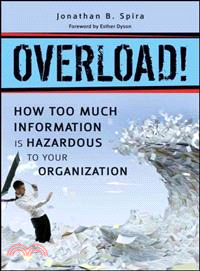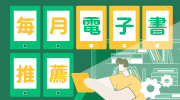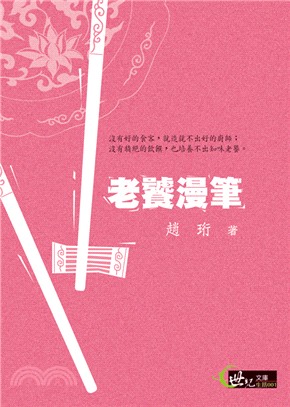Overload! ─ How Too Much Information Is Hazardous to Your Organization
商品資訊
ISBN13:9780470879603
出版社:JOHN WILEY & SONS;LTD
作者:SPIRA
出版日:2011/05/09
裝訂/頁數:精裝/260頁
規格:23.5cm*15.2cm*2.5cm (高/寬/厚)
商品簡介
This groundbreaking book reveals how different kinds of information overload impact workers and businesses as a whole. It helps businesses get a grip on the financial and human costs of e-mail overload and interruptions and details how working in an information overloaded environment impacts employee productivity, efficiency, and morale.
- Explains how information often in the form of e-mail messages, reports, news, Web sites, RSS feeds, blogs, wikis, instant messages, text messages, Twitter, and video conferencing walls bombards and dulls our senses
- Explores what we do with information
- Documents how we created more and more information over centuries
- Reveals what all this information is doing
Timely and thought-provoking, Overload! addresses the reality of and solutions for a problem to which no one is immune.
作者簡介
Jonathan B. Spira is CEO and chief analyst of Basex, a research firm focusing on issues companies face in the knowledge economy. His points of view and commentary have appeared in Time, the New York Times, Business Week, and the Wall Street Journal. Mr. Spira is a founding board member of the Information Overload Research Group, an industry consortium. He is author of Managing the Knowledge Workforce: Understanding the Information Revolution That's Changing the Business World and coauthor of The History of Photography (named a best book of the year by the New York Times).
目次
Preface.
A Note to the Reader.
Acknowledgments.
Introduction.
How We Got Here.
The Age of the Knowledge Worker.
Mark Rivington's Day.
A Global Economy.
Part I: How We Got Here.
Chapter 1: Information, Please?
Chapter 2: History of Information.
The Information Revolution and the Book.
eReaders Rising.
After the Book…Getting the Word Out.
The New News Cycle.
Chapter 3: Welcome to the Information Age.
Is Software Holding Us Back?
The Tools We Use.
Mid-Nineteenth Century Tools: Groundwork is Laid.
Twentieth-Century Tools: The Foundation for the Information Revolution.
Breakthroughs in Productivity.
Online Collaboration Makes Its Entrance.
Enter Charlie Chaplin.
Enter the Office Suite.
An Office for the Twenty-First Century.
The Problem of Too Much of a Good Thing.
The Collaborative Business Environment.
Chapter 4: What Is Information?
Quantifying Information.
Why Information Is Exploding.
How Information Is Going beyond Network and Storage Capabilities.
Structured Information versus Unstructured.
Data Mining to the Rescue?
Chapter 5: The Information Consumer.
Chapter 6: What Is Information Overload?
Meetings: Too Much of a Good Thing?
How Long Has This Been Going On?
More Information – Isn't that What We Wanted?
Information Overload and the Tragedy of the Commons.
The Ephemerization of Information.
Chapter 7: The Cost of Information Overload.
Chapter 8: What Hath Information Overload Wrought?
Aspects of Information Overload.
Information Overload-related Maladies.
Chapter 9: The Two Freds.
Entitlement.
Mad about Information.
Work-life Balance.
Chapter 10: Beep. Beep. Beep.
How Much Texting is Too Much?
Sample Text Phraseology.
The Search for Whatever It Is We Are Looking For.
Chapter 11: Heading for a Nervous Breakdown.
Thinking for a Living.
The Roundtable.
How the Other Half Lives.
The New Busy Is Heading for a Nervous Breakdown.
Part II: Where We Are and Where We Are Going.
Chapter 12: Managing Work and Workers in the Twenty-First Century.
Chapter 13: Components of Information Overload.
E-mail Overload.
Unnecessary Interruptions and Recovery Time.
Need for Instant Gratification.
Everything is Urgent – and Important.
Chapter 14: E-mail.
The Cost of Too Much E-mail.
E-mail and the Network Effect.
Reply-to-All.
Get Rid of “Reply-To-All?”
Profanity in E-mail (Expletive Deleted).
A Day without E-mail.
What to Do With 2.5 Billion E-mails.
Deleting E-mail, Deleting Knowledge.
Chapter 15: The Googlification of Search.
Does the King of the Watusis Drive an Automobile?
Chapter 16: Singletasking.
Attention.
Three Types of Attention.
Automaticity.
The Supertaskers among Us.
Chapter 17: Intel's War on IO.
Recent Information Overload Initiatives.
Quiet Time: A Time for Thought and Reflection.
No E-Mail Day.
E-mail Service Level Agreement.
Chapter 18: Government Information Overload.
The Government's Information Problem.
Collecting Data to Our Detriment?
A Culture of Secrecy.
Too Much Information (almost) Hits Home.
Chapter 19: The Financial Crisis and Information Overload.
No Information Overload in 1907?
Information Overload in the Market.
Chapter 20: The Tech Industry and Information Overload.
The Industry Comes Together?
Information Overload Awareness Day.
What Software Companies Are Doing.
Chapter 21: What Works Better When.
Social Networking Tools in the Enterprise.
What Should I Use When?
10 Tips to Help Lower Information Overload.
Epilogue: 2084: Our Future?
References.
About the Author.
Overload Stories: The Web Site.
Index.
主題書展
更多書展今日66折
您曾經瀏覽過的商品
購物須知
外文書商品之書封,為出版社提供之樣本。實際出貨商品,以出版社所提供之現有版本為主。部份書籍,因出版社供應狀況特殊,匯率將依實際狀況做調整。
無庫存之商品,在您完成訂單程序之後,將以空運的方式為你下單調貨。為了縮短等待的時間,建議您將外文書與其他商品分開下單,以獲得最快的取貨速度,平均調貨時間為1~2個月。
為了保護您的權益,「三民網路書店」提供會員七日商品鑑賞期(收到商品為起始日)。
若要辦理退貨,請在商品鑑賞期內寄回,且商品必須是全新狀態與完整包裝(商品、附件、發票、隨貨贈品等)否則恕不接受退貨。
























